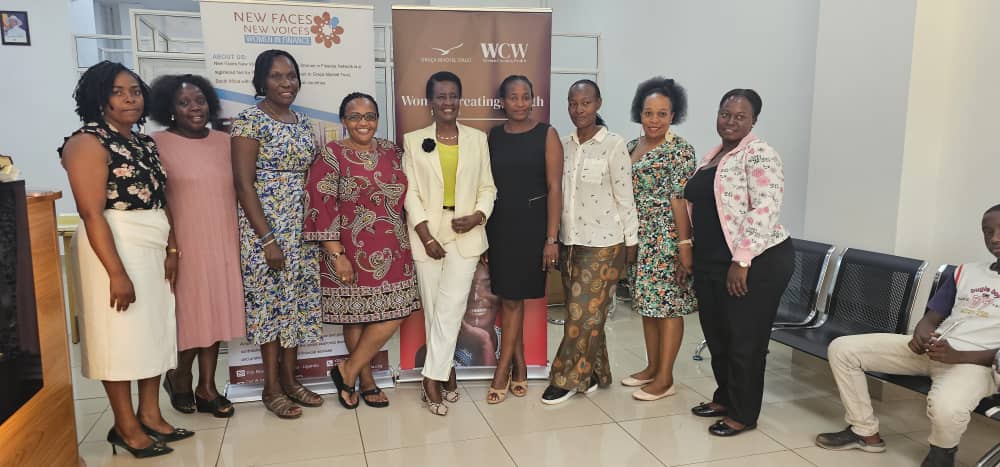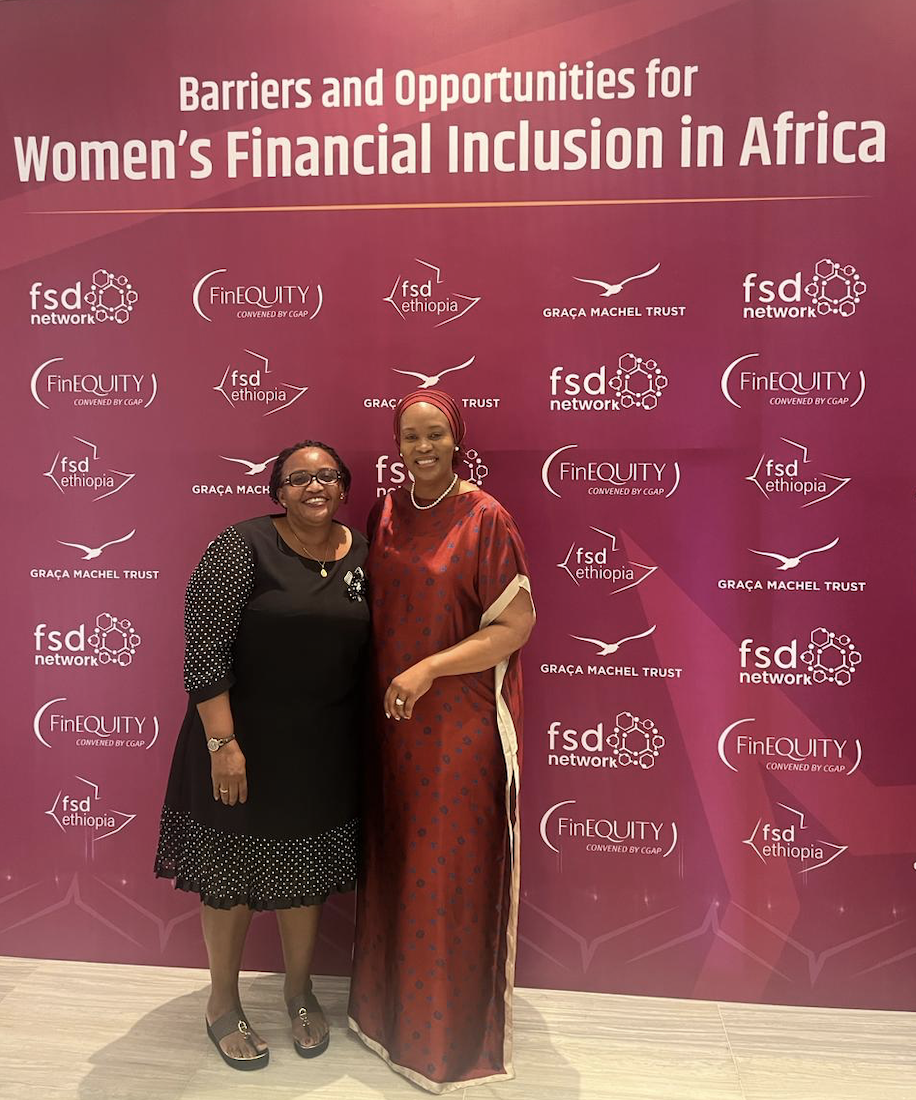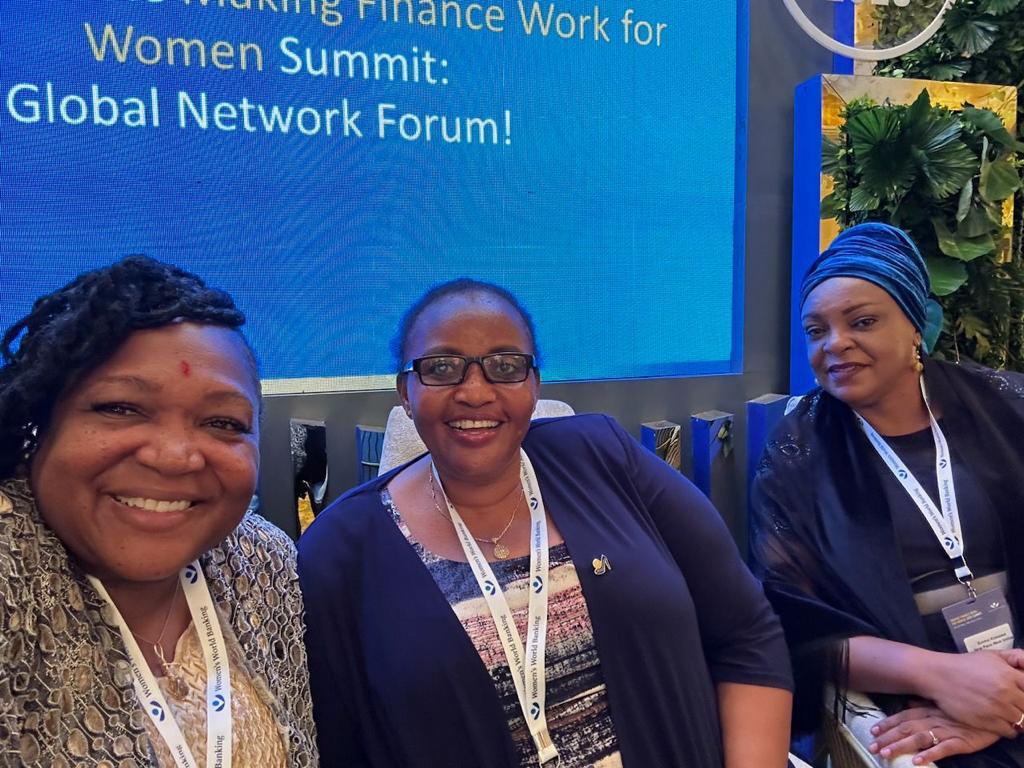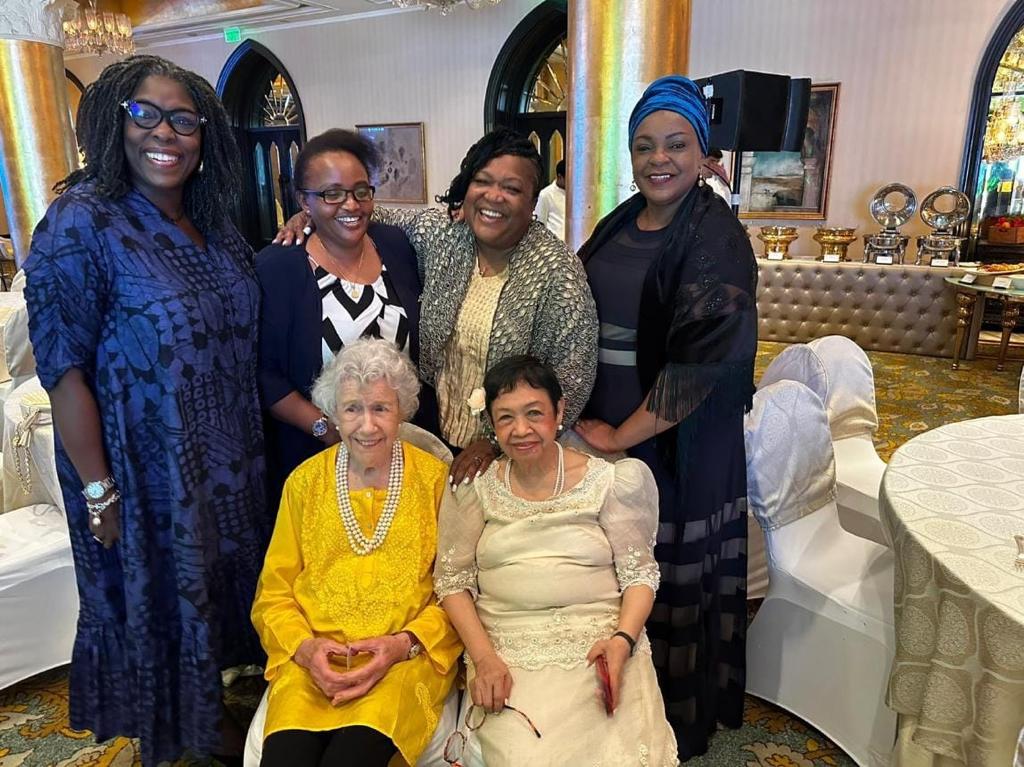“Working with the Trust made me appreciate the gap between the women who have a voice and the women who need our voice more.”
Dr. Theopista Ntale Sekitto is among the few women at the centre of financial inclusion and social innovation in Uganda. As a seasoned banker, social entrepreneur, and philanthropist, Dr Sekitto serves as the Uganda Country Director of New Faces New Voices (NFNV), a Graça Machel Trust initiative promoting financial inclusion of women at different levels of the economy. Dr. Sekitto has earned prestigious honours for championing women’s economic inclusion. As the Africa Ambassador for the Financial Alliance for Women, she collaborates with African banks to tailor financial products to women. Her achievements have been recognised internationally with the Global Village Award and the title of one of the “100 Top Women in the World Making a Difference” by TIAW in 2013. At home, her contributions were celebrated with Uganda’s Presidential Gold Jubilee Medal in 2016. In this candid interview, she reflects on her journey with NFNV and the profound lessons learned along the way.

Dr Theopista Ntale and NFNV Uganda team with Hon. Amelia Anne Kyambadde, Special advisor to the President of Uganda on Trade Matters during her recent visit the Uganda-NFNV Office to see how she can best support the work the network is doing.
Question: Dr. Sekitto, your journey with NFNV began quite early. What motivated you to become one of its founders?
Theopista: “My involvement with NFNV started in 2013 when I was leading a women’s programme supported by the International Finance Corporation (IFC). Mrs. Graça Machel’s vision aligned with my own, seeking out individuals committed to women’s economic advancement, particularly in financial inclusion. As someone already known in this space, it was a natural step for me to help establish the network and oversee its implementation in Uganda.”
Question: What aspects of your work with NFNV do you find most fulfilling?
Theopista: “There is a profound satisfaction in witnessing the tangible impact of our interventions. For example, by developing the Financial Inclusion through Savings and Village Enterprises (FinSave) model, we have brought finance to remote areas, transformed community dynamics, reduced domestic violence, and seen remarkable academic improvements. It is especially heart-warming when such initiatives gain national recognition, as with the Presidential Gold Jubilee Medal I received. When Mrs Machel visited Uganda and we went to the State House, the President already knew about it.”
Question: how do you think being a woman has disadvantaged you and how do you feel about it?
Theopista: “As a woman, I possess a unique perspective when discussing women’s issues — there’s a level of relatability that’s undeniable. However, this can also attract bias and misinterpretation, particularly in areas yet to fully recognise the contributions of women. For instance, I have faced criticism from those who suggest my opposition to polygamy is simply due to my gender. These instances reflect a broader misunderstanding of our advocacy, which is not about challenging personal life choices, but rather about amplifying the voices of women in every aspect of society.”
Question: Your collaboration with the Graça Machel Trust has been very important. Can you elaborate on this partnership?
Theopista: “We are a strategic and implementing partner. Working with the Trust has given us a sense of legitimacy and a broadened platform for visibility. It has also been a journey of growth, teaching me the importance of advocacy and practical policy-making – translating research into actions and systems like the Citizens Financial Reference Bureau, which continues to promote women in financial inclusion today.”
Question: What key insights have you gained from your work with the Trust?
Theopista: “My experience with the Trust has been invaluable in mastering advocacy and developing policy documents. For instance, our research funded by UN Women on financial access for women in SMEs led to the creation of the Citizens Financial Reference Bureau. We discovered a critical gap in understanding among women regarding financial agreements, which propelled us to establish a guidance centre for them. Furthermore, our studies on Digital Lending Practices revealed the need for ‘digital borrowing guidelines’ to protect consumers, prompting government action to regulate digital lenders. This work is significant as it not only informs policy but also directly impacts women’s financial literacy and inclusion.”
Question: In what ways has the Trust contributed to the success of NFNV- Uganda?
Theopista: “The Trust has greatly enhanced our organisation’s reach and reputation, has opened doors, granting us immediate legitimacy and increased visibility. Our affiliation with the Trust amplifies our efforts on a larger scale. Additionally, through the Trust, I have gained invaluable knowledge in women’s leadership, advocacy, and strategic planning, which has been important for our the growth of our network. The Trust has also expanded my professional network significantly, connecting me with influential figures across different continents, which has been instrumental in advancing our mission of financial inclusion for women.”
Question: Looking back, what moments with the Trust stand out for you?
Theopista: “A key highlight was in 2017 when I received recognition from Mrs. Machel during one of our Women Networks Conference in Mozambique for my active contribution to the Trust. Another is the success of the FinSave model, which was a testament to our collaborative spirit and strategic risk-taking.”
Question: How has your association with the Trust impacted you professionally?
Theopista: “Working with the Trust made me appreciate the gap between the women who have a voice and the women who need our voice more. The majority of women, especially on the African continent, because the ecosystem they are in does not allow them to speak up for themselves. So we have the obligation as women who are at a certain level to be their voice. I have also come to appreciate that when we talk about inclusion, financial inclusion, and social inclusion, it is not just a policy document but a practice that is so intentional that one can easily measure it even when you are gone. Yes, I used to talk about inclusion, but working with the Trust, I have come to appreciate that It is not just a paper, but a practice. People have to know that inclusion is the way to go for everything and not just talk about it but practice it. Be intentional that you can measure it and say this is where I found this community, this was my intervention and these are my results -you know, visible results.”
In her pursuit of inclusive financial environments, Dr. Sekitto is a voice for change. Her leadership is shaping the path for generations to come. Catch up on more of her activities below.

Dr Sekitto with the Trust’s Director of Programmes, Shiphra Chisha, during a recent FinEquity Global, Africa Annual Convening in Ethiopia, where she pointed out the importance of women being included in co-creating financial services and products. The Trust is part of FinEquity Africa – a regional community of practice (CoP) to advance women’s financial inclusion and promote equitable access to and use of a wide range of financial services across Africa.

Dr. Sekitto (centre) joined Emma Kawawa (right) of NFNV- Tanzania to represent the Trust at the Women’s World Banking Conference in Mumbai. Pictured here with Deon Woods Bell (left) from the Bill and Melinda Gates Foundation .

With other network leads with Michael Walsh, President of Women’s World Banking, at the ‘Making Finance Work for Women Conference in Mumbai.
Read more on Dr. Theopista Ntale Sekitto NFNV activities in this blog and more here.










 The Trust supports and mobilises civil society networks on issues of ending child marriage, ending violence against children, ending female genital mutilation and promoting children’s rights, to carry out advocacy and action across Africa. Special focus is placed on Malawi, Mozambique, Tanzania and Zambia where child marriage continues to be a problem largely driven by poverty, gender inequality, harmful traditional practices, conflict, low levels of literacy, limited opportunities for girls and weak or non-existent protective and preventive legal frameworks.
The Trust supports and mobilises civil society networks on issues of ending child marriage, ending violence against children, ending female genital mutilation and promoting children’s rights, to carry out advocacy and action across Africa. Special focus is placed on Malawi, Mozambique, Tanzania and Zambia where child marriage continues to be a problem largely driven by poverty, gender inequality, harmful traditional practices, conflict, low levels of literacy, limited opportunities for girls and weak or non-existent protective and preventive legal frameworks.




 Education is a fundamental right for all children, which is also a vehicle for social, economic and political transformation in communities, countries and the African continent at large. Recent studies indicate a lack of progress in some of the critical commitments aimed at improving education quality, access, retention and achievement, particularly for girls. In most African countries, girls may face barriers to learning, especially when they reach post-primary levels of education. By implementing multi-dimensional approaches to education which includes core education, personal development, life skills and economic competencies, the Trust partners with funding partners, governments, civil societies and the private sector to improve education access.
Education is a fundamental right for all children, which is also a vehicle for social, economic and political transformation in communities, countries and the African continent at large. Recent studies indicate a lack of progress in some of the critical commitments aimed at improving education quality, access, retention and achievement, particularly for girls. In most African countries, girls may face barriers to learning, especially when they reach post-primary levels of education. By implementing multi-dimensional approaches to education which includes core education, personal development, life skills and economic competencies, the Trust partners with funding partners, governments, civil societies and the private sector to improve education access.

 The Nutrition and Reproductive, Maternal, New-born, Child and Adolescent Health and Nutrition, (RMNCAH+N) of the Children’s Rights and Development Programme aims at promoting the Global Strategy for women, children and adolescents’ health within the Sustainable Development Goals (SDG) agenda. The strategy emphasises on the importance of effective country leadership as a common factor across countries making progress in improving the health of women, children and adolescents.
The Nutrition and Reproductive, Maternal, New-born, Child and Adolescent Health and Nutrition, (RMNCAH+N) of the Children’s Rights and Development Programme aims at promoting the Global Strategy for women, children and adolescents’ health within the Sustainable Development Goals (SDG) agenda. The strategy emphasises on the importance of effective country leadership as a common factor across countries making progress in improving the health of women, children and adolescents. Through its Early Childhood Development (ECD) plan, The Trust will seek to put into action the new science and evidence Report that was presented by Lancet Series on Good and early development – the right of every child. This will be achieved by mobilising like-minded partners to contribute in the new science and evidence to reach all young children with ECD. The Trust’s goal is to be a catalyst for doing things differently, in particular, to rid fragmentation and lack of coordination across ECD sectors. In response to evidence showing the importance of political will in turning the tide against the current poor access and quality of ECD. Even before conception, starting with a mother’s health and social economic conditions, the early years of a child’s life form a fundamental foundation that determines whether a child will survive and thrive optimally.
Through its Early Childhood Development (ECD) plan, The Trust will seek to put into action the new science and evidence Report that was presented by Lancet Series on Good and early development – the right of every child. This will be achieved by mobilising like-minded partners to contribute in the new science and evidence to reach all young children with ECD. The Trust’s goal is to be a catalyst for doing things differently, in particular, to rid fragmentation and lack of coordination across ECD sectors. In response to evidence showing the importance of political will in turning the tide against the current poor access and quality of ECD. Even before conception, starting with a mother’s health and social economic conditions, the early years of a child’s life form a fundamental foundation that determines whether a child will survive and thrive optimally.